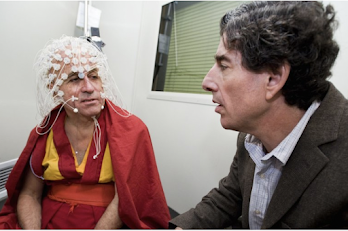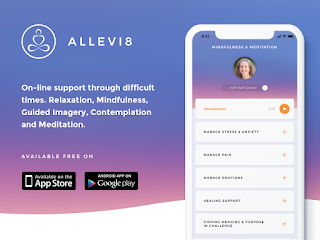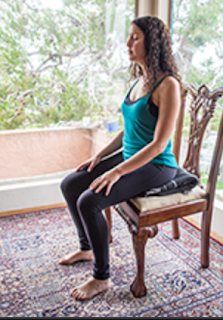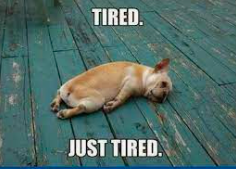Consider this an odd title? Maybe… However, we all know that one day we will die; and that leaves us all with a fundamental choice. Do we live our life in fear and denial of death, or do we live a life informed by death? It is obvious our attitude to death heavily informs how we live.
The basic proposition is that while the first option has more immediate appeal, the latter will actually serve us much, much better.
Contemplating death can bring you more alive.
Contemplating death can change your life for the better...
So this week, how to contemplate death constructively? How to plan for a good death? All prompted by me speaking on this theme for the Vajrayana Institute’s free online conference Dharma in Daily Life on Saturday the 8th October, but first
Thought for the dayWhat a beautiful and what a healing mystery it is
That from contemplating, continually and fearlessly,
The truth of change and impermanence,
We come slowly to find ourselves face to face,
In gratitude and joy,
With the truth of the changeless,
With the truth of the deathless, unending nature of mind!
Sogyal Rinpoche
Reflect for a moment…
It is clear… Fear and denial of death lead to either a defensive life, or a cavalier one. To withdrawal, to holding back, to anxiety and instability. Or to extravagance, bravado, risk taking, to the eat, drink and be merry for tomorrow we die style of living.
By contrast, a life informed by death means we take nothing for granted, we appreciate all we have, we make the most of relationships, we leave as little undone as possible. We are more present, more engaged, more grateful. More truly alive.
Most of us reach adulthood with little real reflection upon death. If, and when, we do realise the merit of doing so, then the question arises, how do we do it?
Having worked with thousands of people facing life-threatening illness over 4 decades, what follows is a summary of the guidelines we shared in our self-help, lifestyle-based programs, and is reproduced from my book You Can Conquer Cancer - available as an audio book or in hard copy.
May this checklist be of use for you, and if you follow through, you may well come to experience how contemplating death can bring you more alive.
END OF LIFE CHECKLIST
i) The practical matters - “getting your affairs in order”
· Prepare or update your will.
· Attend to your financial affairs and ensure your partner can access joint accounts and other key financial and legal matters if necessary.
· Create an Enduring Power of Attorney (a simple Power of Attorney ceases if you become incapacitated).
· Consider establishing a Living Will or Enduring Power of Attorney – Medical Treatment form. This will set out your preferences and directions for end of life treatment options. These directions would provide guidance to medical staff and family if you become incapacitated, are not likely to recover, and choices need to be made regarding being left to die naturally or to have major interventions. You can also mention the levels of pain medication desired (maximum or minimal) and whether you would elect to have CPR (cardiopulmonary resuscitation) if your heart were to stop in this end stage of life. You could also nominate who you might want present (or absent) at the end of life and indicate a preference for being at home, in hospital or a hospice.
· Consider your possessions. Do you prefer for some items to go to particular people? If so, make sure this is clear; maybe consider giving some things away while you are alive.
· Designate who you wish to look after any children, parents or other dependants if you and / or your partner were to die. Make sure the designated people know and agree.
· Complete as many of the tasks in your life as possible. Give priority to your “Bucket List”. Aim to die free of regret for things left undone – either do them or let them go.
ii) Communicate. Do not die leaving people wondering!
· Express your love. You may think they know, maybe they are psychic, but tell them anyway!
· Consider leaving messages for significant people to be read or viewed at significant times. This can be particularly useful and comforting if you have young children now. Ideally, your write or record your messages and deliver them in person on the 18th birthday or at the wedding; but if you are not there, the message will have real meaning.
· Consider documenting your life. You could simply create a photo album from childhood on, or collate any old videos or DVD’s. Or you could be more personal and specifically record your insights, reflections, regrets, passions etc.
· Forgive. Forgive. Forgive. Resentment is like a cancer in itself. Forgiveness heals the heart and sets us free. Review the forgiveness section in the Healthy Emotions chapter and do it! Forgive others. Forgive yourself.
iii) Immediately after death
· What preferences do you have for your body? Should it be left undisturbed for a while, and if so, for how long? In hospitals especially, there is often a need to clear beds for the next person (a tough reality), but family and friends may find great value in being able to sit quietly with the body after death. Also some spiritual traditions indicate there is real benefit for the person who has died if the body is left undisturbed for even up to 3 days after death. This length of time may not be practical, but you may choose to indicate your own preference.
· What procedures do you want carried out with your body? Have you registered for organ donation? Embalming is a highly invasive procedure and only legally required if the body is being transported internationally. Have you a preference for who should wash the body and what clothes it will be dressed in?
· Have you a preference for a particular type of coffin or casket?
· Burial or cremation? Where?
iv) Funeral Service
· Do you want one? If so, will it be closed to include only the immediate family, or open for everyone who wishes to attend? Be reminded a funeral can help those left behind a great deal and consider wherever possible what will help them.
· Where will the service be held and who will officiate – a civil celebrant or a member of your religious tradition?
· What style of service? Traditional according to your religion? Themed such as New Orleans Jazz? What emphasis will there be on the celebration of life and the grief of loss?
· What music, poems, readings to include?
· Who will speak? Who gives the main eulogy? Will others reflect on your life, offer readings etc?
· Are there particular interest groups to include and feature such as sporting or service clubs?
· What about after the funeral? Will there be a wake? If so where, who organizes it and how will it be financed and provided?
v) Anything else important?
If so add it to your list.
A healthy lifestyle makes for a good death
A surprising number of people make the mistake of approaching death in an unhealthy way. Some people tell me “I tried the diet and the meditation. It helped for a while, but now I am approaching death I am going back to my old way”. This is a crucial point. Eating well makes it easier to die well. Why?
Because heavy foods and junk foods add a burden to your system. High fat diets make for sticky blood and lead to higher risks of embolism, stroke and heart failure. Bad diets promote inflammation that is both uncomfortable and is likely to aggravate any health issues you have. Bad diets are degenerative, whereas our healthy diet is regenerative and anti-inflammatory. Meditation is also anti-inflammatory and regenerative, whilst it also clears the mind, reduces anxiety and pain and helps us connect with who we really are.
If I thought I was really closer to dying rather than just the fact of knowing I could die any day, I would be even more particular about what I ate and drank, and I would meditate even more than the average one hour per day I do currently.
Be gentle on yourself.
Live well and die well.
Contemplating death can bring you more alive.



















